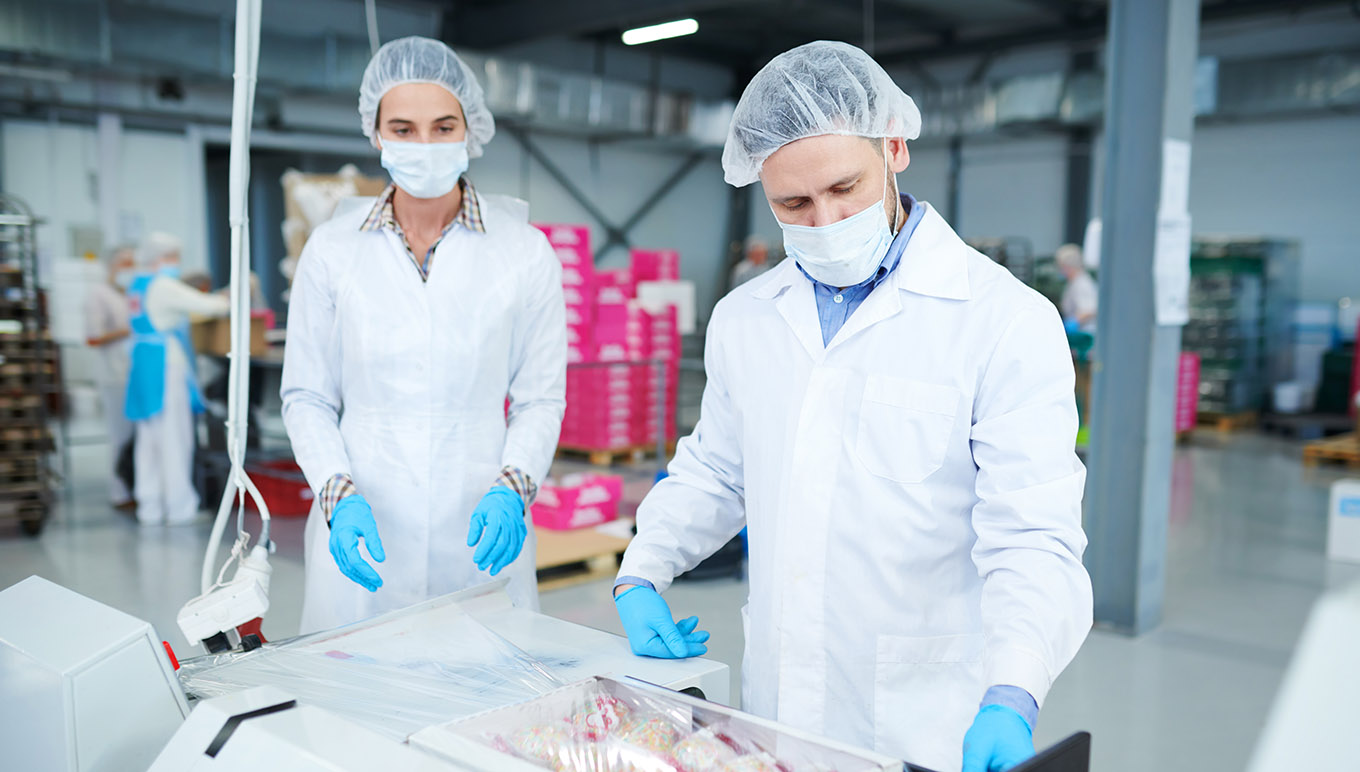In diesem Beitrag vorgestellt
Die 4 Gründe, warum die Rückverfolgbarkeit in der Lebensmittelherstellung für den Erfolg unerlässlich ist
Die 4 Gründe, warum die Rückverfolgbarkeit in der Lebensmittelherstellung für den Erfolg unerlässlich ist
Blog-Beitrag
Willst du die Highlights? Hier sind die wichtigsten Erkenntnisse
In diesem Blog werden die vier wichtigsten Gründe erörtert, warum die Rückverfolgbarkeit von Lebensmitteln für Unternehmen von entscheidender Bedeutung ist:
Einhaltung gesetzlicher Vorschriften – Verstehen Sie, was gesetzlich vorgeschrieben ist, und vermeiden Sie empfindliche Strafen.
Gewährleistung der Lebensmittelsicherheit und Rückrufbereitschaft – Schützen Sie die öffentliche Gesundheit sowie den Ruf Ihrer Marke und seien Sie auf einen Notfall im Bereich der Lebensmittelsicherheit vorbereitet.
Volle Produkttransparenz – Geben Sie den Verbrauchern ein klares Bild davon, was sie kaufen, und bauen Sie Vertrauen bei den Käufern auf.
Vermeidung von Lebensmittelbetrug – Schützen Sie Ihr Unternehmen vor einer immer häufiger auftretenden Straftat, die schwerwiegende negative Auswirkungen haben kann.

Laut einem kürzlich von Foods Connected veröffentlichten Forschungsbericht erkennen drei von vier Lebensmittelunternehmen die entscheidende Bedeutung der Rückverfolgbarkeit an. Unternehmen geben jedes Jahr viel Geld aus, um die Transparenz der Lieferkette und die bidirektionale Produktverfolgung aufrechtzuerhalten – der globale Markt für die Rückverfolgbarkeit von Lebensmitteln wird bis 2032 voraussichtlich auf über 35 Milliarden US-Dollar anwachsen.
Selbst wenn Sie wissen, wie wichtig es ist, in Ihren Einrichtungen über gute Verfahren zur Rückverfolgbarkeit von Lebensmitteln zu verfügen, sind die Gründe dafür in Ihrem Kopf möglicherweise nicht ganz so ausgeprägt. Das ist jetzt ein guter Zeitpunkt, um einen Schritt zurückzutreten, sich daran zu erinnern, warum die Rückverfolgbarkeit von Lebensmitteln eine tägliche Priorität sein muss, und zu bestätigen, dass Ihre Systeme und Prozesse optimiert sind, um in dieser Funktion erfolgreich zu sein.
In diesem Blog behandeln wir die vier überzeugendsten Gründe für die Notwendigkeit der Rückverfolgbarkeit in der Lebensmittelherstellung. Wir werden auch darauf eingehen, wie Enterprise Resource Planning (ERP) die Effektivität Ihres Unternehmens in dieser Hinsicht steigern kann und warum es jetzt an der Zeit ist, entweder Ihre digitale Transformation zu starten, wenn Sie keine Lösung eingeführt haben, oder Ihren Ansatz zur Rückverfolgbarkeit neu zu bewerten, wenn Sie bereits eine Plattform implementiert haben.
1. Einhaltung staatlicher Vorschriften
Die ersten Schritte zur Kodifizierung ordnungsgemäßer Rückverfolgbarkeitspraktiken in der Lebensmittel- und Getränkeindustrie wurden mit der Gründung der Global Food Safety Initiative (GSFI) im Jahr 2000 unternommen. Gemeinsam mit GS1 hat die Organisation den Global Traceability Standard (GTS) eingeführt, um wichtige Erkenntnisse und Kenntnisse für Organisationen und Branchen bereitzustellen, die langfristige Rückverfolgbarkeitsziele entwickeln.
In den folgenden Jahren haben Regierungsbehörden auf der ganzen Welt Gesetze erlassen, um die Anforderungen an die Rückverfolgbarkeit für Lebensmittel- und Getränkeunternehmen in ihren jeweiligen Regionen weiter zu spezifizieren:
Das allgemeine Lebensmittelrecht der Europäischen Union von 2002 enthält die Verordnung (EG) Nr. 178/2002, die vorschreibt, dass Unternehmen über ein umfassendes Rückverfolgbarkeitssystem verfügen müssen, um die Verbraucher vor dem Risiko von Kontaminationen in der Lieferkette zu schützen.
Das Vereinigte Königreich– zum Zeitpunkt der Verabschiedung des Allgemeinen Lebensmittelgesetzes noch EU-Mitglied – stützt seine eigenen Rückverfolgbarkeitsanforderungen auch nach dem Brexit auf dieselben Prinzipien, obwohl es nun in der Verantwortung der Food Standards Agency (FSA) liegt, die Einhaltung durchzusetzen.
In der Zwischenzeit wird in den USA, der Food Safety Modernization Act (FSMA) von 2011 brachte vergleichbare Rückverfolgbarkeitsstandards in Abschnitt 204 mit sich, der jetzt als Food Traceability Final Rule bekannt ist und ab Juli 2028 in Kraft treten soll. Zu den neuen Anforderungen dieser Verordnung gehört die Aufzeichnung aller Schlüsseldatenelemente (Key Data Elements, KDEs) an allen kritischen Nachverfolgungspunkten (CTPs) für die 16 Lebensmittelkategorien, die in der Liste der Rückverfolgbarkeit von Lebensmitteln (FTL) aufgeführt sind. Unternehmen, die FTL-Lebensmittel verarbeiten, müssen außerdem über einen detaillierten Rückverfolgbarkeitsplan verfügen und Rückverfolgbarkeitschargencodes (TLCs) in einem festgelegten Format verwenden.
Die Folgen der Nichteinhaltung der Final Rule zur Rückverfolgbarkeit von Lebensmitteln und der Rückverfolgbarkeitsvorschriften anderer Länder reichen in der Regel von Strafen und Geldbußen bis hin zur vorübergehenden oder sogar dauerhaften Schließung. Dies unterstreicht, wie wichtig es für Lebensmittel- und Getränkeunternehmen wie Ihres ist, über eine digitale Lösung – wie ein branchenspezifisches Lebensmittel-ERP– zu verfügen, um die Erfassung und Verwaltung von Rückverfolgbarkeitsdaten zu unterstützen, sowie über eine Kultur, die Verantwortlichkeit, Sorgfaltspflicht und gründliche Schulungen fördert.
2. Gewährleistung der Lebensmittelsicherheit und der Rückrufbereitschaft
Rückverfolgbarkeit und Lebensmittelsicherheit werden immer untrennbar miteinander verbunden sein, was nicht zuletzt darauf zurückzuführen ist, dass eine vollständige bidirektionale Rückverfolgung von Zutaten und Produkten erforderlich ist, um die Quelle von Kontaminationen zu ermitteln und betroffene Artikel zu isolieren. Die Statistiken zeigen, dass die Branche in dieser Hinsicht noch viel Raum für Verbesserungen hat, da die Weltgesundheitsorganisation darauf hinweist, dass jährlich mehr als 7 % der rund 8 Milliarden Menschen auf dem Planeten an lebensmittelbedingten Krankheiten erliegen.
Die Auswirkungen sind auch weitaus schlimmer als eine Magenverstimmung – 420.000 sterben jedes Jahr an diesen Vorfällen, was einem Verlust von 33 Millionen gesunden Lebensjahren (DALYs) entspricht. Dies macht deutlich, dass es unerlässlich ist, Ihre Rückverfolgbarkeitsprozesse und -systeme so zu gestalten, dass Sie die Verbraucher bestmöglich vor negativen Ergebnissen schützen können, nicht nur im Interesse der öffentlichen Gesundheit, sondern auch zum Schutz Ihres Markenrufs.
Nicht deklarierte Allergene sind für mehr als die Hälfte aller Notfälle im Bereich der Lebensmittelsicherheit verantwortlich, daher sollten Sie Ihre Teams über die problematischsten Zutaten aufklären, bei ihrer Verwendung besondere Vorsicht walten lassen und sicherstellen, dass sie während des Transports und der Lagerung von anderen Materialien getrennt werden. Die U.S. Food and Drug Administration (FDA) hat eine Liste von neun Lebensmitteln mit dem höchsten Risik overöffentlicht, während die FSA eine Liste von 14 hat, genau wie die Europäische Behörde für Lebensmittelstandards (EFSA).
Sie müssen auch einen gründlichen und effektiven Rückrufplan aufstellen, um im Falle des Undenkbaren vollständig vorbereitet zu sein. Zuerst müssen Sie eine geschulte und vertrauenswürdige Gruppe aus Ihren internen Teams zusammenstellen, um Ihre Bemühungen zu unterstützen, und dann können Sie diese Schritte als Ausgangspunkt für Ihren gesamten Ansatz verwenden:
Alarmieren und aktivieren Sie Ihr Rückrufteam.
Bestimmen Sie den Schweregrad der Bedrohung und ihren Ursprung außerhalb oder innerhalb Ihrer Einrichtungen.
Erteilen Sie alle erforderlichen Mitteilungen, einschließlich derjenigen an die Strafverfolgungsbehörden.
Sperren Sie ausgehende Sendungen und isolieren Sie alle betroffenen Produkte.
Legen Sie eine Vorgehensweise für die Rücknahme und Vernichtung kontaminierter Waren fest.
Reichen Sie alle erforderlichen Unterlagen ein, um die vollständige Einhaltung der Vorschriften zu gewährleisten.
Ein speziell entwickeltes ERP kann dazu beitragen, Notfälle im Zusammenhang mit der Lebensmittelsicherheit von vornherein zu verhindern, indem es Ihnen Einblick in den Weg Ihrer Materialien von der Quelle bis zur Fabrikhalle und weiter gibt. Auf diese Weise behalten Sie den Überblick über gemeinsam genutzte Oberflächen und optimieren das Allergenmanagement in der gesamten Lieferkette.
Darüber hinaus kann ein fortschrittliches System wie Aptean Food & Beverage ERP den Rückrufprozess rationalisieren, indem es bestimmte Schritte automatisiert und die Bestimmung des Ursprungs einer Kontamination mit vollständigen Rückverfolgbarkeitsinformationen viel einfacher macht. Zeit ist von entscheidender Bedeutung, wenn solche Probleme auftreten, daher lohnt es sich, die bestmögliche Lösung zu haben, um Ihre Leistung in der Krise zu verbessern.
3. Vollständige Produkttransparenz
Ein weiterer Grund, warum die Rückverfolgbarkeit von Lebensmitteln so wichtig ist, ist die steigende Nachfrage der Verbraucher nach klaren Informationen über Zutaten, Produkte und Beschaffung. Laut ForFarming geben 93 % der Verbraucher an, dass es für Marken und Hersteller wichtig ist, detaillierte Informationen darüber bereitzustellen, was in Lebensmitteln enthalten ist und wie sie hergestellt werden.
Glücklicherweise helfen Ihnen solide Verfahren zur Rückverfolgbarkeit von Lebensmitteln dabei, den Käufern die Transparenz zu bieten, die sie sich wünschen. Wenn Sie auf einen Blick wissen, woher Ihre Materialien stammen und wie sie hergestellt wurden – und dass Ihre Handelspartner zertifiziert sind, alle Gesetze einhalten und nachhaltige Praktiken befolgen – können Sie die Fakten sicher auf der Produktverpackung präsentieren, damit die Verbraucher umfassend informiert sind.
Darüber hinaus können Sie mit einer ERP-Plattform Ihren Datenerfassungsprozess automatisieren, indem Sie die Software in tragbare Barcode- und QR-Code-Scanner integrieren, um die Genauigkeit zu gewährleisten und Ihre Datenbank in Echtzeit zu aktualisieren. Es kann dann leicht auf Produktgrafiken und Etiketten übertragen werden, um die Sichtbarkeit zu gewährleisten und alle notwendigen Deklarationen für Allergene oder andere gesundheitliche Aspekte vorzunehmen.
Die Verbraucher von heute haben hohe Erwartungen an die Marken, die sie unterstützen, und sie haben eine Vielzahl von Optionen zur Auswahl. Vollständige Transparenz bei den Zutaten- und Produktdetails, so dass die Verbraucher sicher sein können, dass das, was sie essen, gesund ist und ethisch einwandfrei hergestellt wurde, wird am besten durch ein spezialisiertes Lebensmittel-ERP ermöglicht.
4. Vermeidung von Lebensmittelbetrug
Lebensmittelbetrug – die absichtliche Falschdarstellung von Lebensmitteln, in der Regel aus wirtschaftlichen Gründen – ist ein wachsendes Problem. FoodNavigator berichtet, dass sich die Fälle in den letzten vier Jahren verzehnfacht haben und die Weltwirtschaft jährlich etwa 40 Milliarden US-Dollar kosten. Sie hat schwerwiegende Auswirkungen auf das Vertrauen der Verbraucher und die Lebensmittelsicherheit und stellt ein ernsthaftes Risiko dar, vor dem sich Ihr Unternehmen schützen muss.
Die häufigsten Formen dieses Verbrechens sind Substitution (oft Austausch eines wertvolleren Inhaltsstoffs gegen einen billigeren), falsche Etikettierung (insbesondere mit falschen Herkunftsangaben) und Fälschung. Die Verdünnung oder Verwendung von Füllstoffen gilt ebenfalls als Lebensmittelbetrug, ebenso wie das Verschweigen von Verderb oder Beschädigung und die Zugabe von Stoffen, die nicht für die Verwendung in Verbrauchsmaterialien zugelassen sind.
Mit den Rückverfolgbarkeitsfunktionen einer branchenspezifischen ERP-Lösung für Lebensmittel verfügt Ihr Unternehmen über die Tools, die es benötigt, um Lebensmittelbetrug zu verhindern, einschließlich vollständiger Transparenz von Lieferantendetails, Zertifikaten, Chargennummern und mehr. ERPs bieten auch die Möglichkeit, genehmigte Lieferanten vorauszuwählen und Benutzern zu ermöglichen, nur aus diesen Quellen zu bestellen, sowie eine Rezeptsteuerung, die unbefugte Änderungen verhindert.
Getränke, Milchprodukte und Meeresfrüchte gehören zu den am häufigsten betroffenen Produktkategorien, wenn es um Lebensmittelbetrug geht, aber betrügerische Nüsse, Samen und Eier werden immer häufiger. Unabhängig davon, mit welchen Gegenständen sich Ihr Unternehmen befasst, benötigen Sie eine zuverlässige Verteidigung gegen dieses Verbrechen, da es zu schlechter Publicity und Notfällen im Bereich der öffentlichen Gesundheit führen kann.
Aptean Food & Beverage ERP: Die überlegene Lösung für vollständige Rückverfolgbarkeit
In diesem Beitrag haben wir uns auf die Rückverfolgbarkeitsfunktionen von Lebensmittel-ERPs konzentriert, aber wenn Sie noch kein System implementiert haben, müssen Sie die Optionen auf dem Markt bewerten und feststellen, was die beste Rückverfolgbarkeitssoftware für Ihr Unternehmen wirklich ist. Es gibt viele Alternativen, und es liegt an Ihnen, die beste Lösung für Ihr Unternehmen zu finden.
Um die Attraktivität von ERP-Lösungen zu demonstrieren, sollten wir jedoch betonen, dass es noch viel mehr gibt, was man an diesen All-in-One-Plattformen lieben kann. In Wahrheit handelt es sich um unternehmensweite Schnittstellen für die Zusammenarbeit, mit Funktionen und Tools, die verschiedenen Abteilungen und Betriebsbereichen gewidmet sind und alle entwickelt wurden, um Unternehmen wie Ihrem einen Wettbewerbsvorteil zu verschaffen.
Dies gilt insbesondere für unsere branchenspezifische Lebensmittel- und Getränkelösung, Aptean Food & Beverage ERP, die auf der Stärke jahrzehntelanger Branchenerfahrung und eines tiefgreifenden Verständnisses von Best Practices für Lebensmittel- und Getränkeunternehmen basiert. Wir haben auch eine vollständige Suite von Modulen entwickelt, um den einzigartigen Herausforderungen gerecht zu werden, die hochspezialisierte Betriebe benötigen, wie z. B . das Catch-Weight-Management für Fleisch- und Meeresfrüchtelieferanten und die Sendungsverfolgung für Frischeerzeuger.
Darüber hinaus sind wir ein branchenweit anerkannter Anbieter, der Lösungen im SaaS-Modell mit Cloud-Hosting anbietet und Ihnen die Flexibilität bietet, eine schlanke Bereitstellungsmethode mit geringeren Vorabkosten, höherer Sicherheit und einer Verfügbarkeit von 99,9 % zu wählen. Darüber hinaus nutzt unser System eine robuste, einzigartige und branchenspezifische Technologie, die auf einer zugrunde liegenden Microsoft Dynamics 365 Business Central-Plattform basiert, was ihm Vertrautheit und eine benutzerfreundliche Oberfläche verleiht.
Schließlich sollten Sie wissen, dass Sie mit Aptean immer Zugang zu den neuesten technologischen Innovationen haben. Wir sind stolz darauf, künstliche Intelligenz (KI) in den Mittelpunkt unseres Handelns zu stellen, und wir freuen uns, immer mehr unserer Lösungen auf die All-in-One-Plattform AppCentral zu bringen, unsere eigene Suite von KI-Tools und vorvernetzten Anwendungen, um Ihren End-to-End-Prozess zu optimieren.
Sind Sie bereit, mehr über Aptean Food & Beverage ERP zu erfahren und darüber, wie es den Ansatz Ihres Unternehmens zur Rückverfolgbarkeit in der Lebensmittelherstellung verbessern kann? Setzen Sie sich noch heute mit uns in Verbindung oder fordern Sie eine personalisierte Demo an.
Optimieren Sie die Rückverfolgbarkeit in Ihrem Betrieb
Sie möchten Ihr Lebensmittel- oder Getränkegeschäft weiterentwickeln? Wir helfen Ihnen gerne dabei.



 Jack Payne | Vice President, Product Management & Solutions Consulting
Jack Payne | Vice President, Product Management & Solutions Consulting